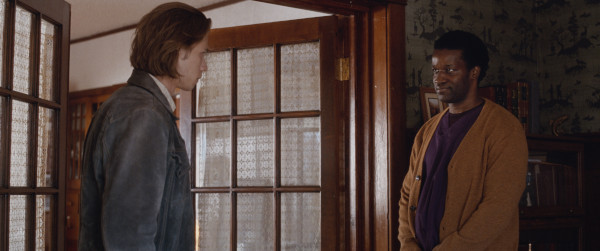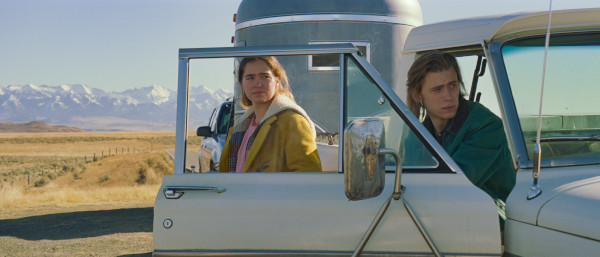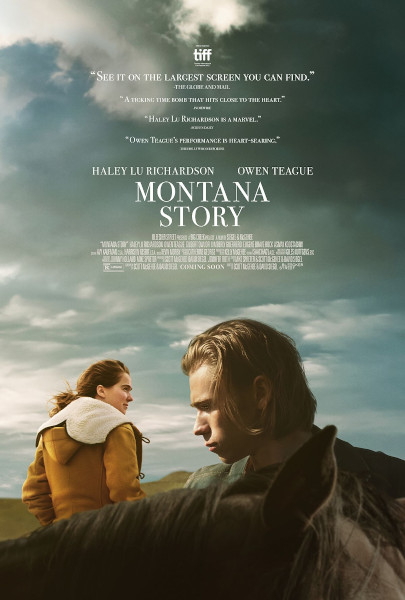‘Montana Story’ Is a Mellow, Lyrical Family Drama

Montana Story speaks to a moment in which old monuments have eroded, layers of mythology have begun to unfurl, and the skyline is altered in ways that can’t be adequately articulated. Landscape is integral to Scott McGehee and David Siegal’s film, its setting functions as a means of explicating the chasms of understanding that time and distance create. The immensity of the symbolism captured within the Big Sky can serve to obscure the quiet struggle taking place underneath it, and it is this tension that Montana Story sets out so eloquently.
Cal (Owen Teague) returns to his family’s 200-acre ranch in Montana to care for his sick father. His estranged sister, Erin (Haley Lu Richardson), arrives unexpectedly at the ranch, seven years after she ran away following a confrontation with their father. Cal arranges for the last ageing horse left in the stables, Mr. T, to be put down; but Erin decides that she will take the horse back with her to upstate New York, and begins to arrange for the transportation. As the siblings share the details of their lives, they must reckon with the event that drove Erin away.

Montana Story has echoes of Wim Wenders at his most meditative, tapping into the aching sadness of these blank expanses fringed with imperious mountain ranges. As Cal and Erin drive across stark plains and struggle to come to terms with the people they have become, it is hard not to be reminded of Kings of the Road (1976) or Paris, Texas (1984).
It is equally a sort of Bressonian Western; the understatement of its tone undercuts the majesty of the backdrop, achieving a naturalism that interrogates the nature of the frontier and the legend that attends it. Cinematographer Giles Nuttgens lensed one of the defining neo-Westerns, Hell or High Water (2016), and there are parallels to the chilly, forbidding qualities he brings here.
Cal and Erin struggle to meet the past on their own terms: Cal approaches life from a position of anxiety, while Erin projects tenacity; but they are equally grasping for purchase against the upheavals that have warped what was once familiar.

Both performances reveal a slow seething to the surface: Richardson has a severity to her demeanor, which articulates Erin’s determination to rectify old wounds and pay off a karmic debt; while Teague is tortured by his inaction, striking a penitent posture to expiate his burden of guilt. The unease which Richardson and Teague bring to their interplay is compelling, unearthing depths of loss, pain, and anger. Montana Story hinges on its central performances, but also noteworthy is Gilbert Owuor as Ace, the father’s nurse, who functions as a buffer between these emotional poles.
McGehee and Siegal’s framing communicates as much as dialogue ever could; contrasting the smallness of the story with the vastness of the landscape, charting the reverberations that are felt from what is left behind from a solitary life, and commenting on social issues with a light touch. But the writing occasionally lets them down, veering into expository territory rather than allowing details to be inferred from the unspoken elements. At one point, Ace reminds Cal that ‘Some things are clear without explanation’; it is advice that writers McGehee, Siegal and Mike Spreter should have heeded, as the somewhat inelegant handling of the family’s backstory doesn’t live up to the sophistication of the visuals, or the skill of the performances.

Montana Story belongs in the canon of post-financial crisis films that deal with characters seeking a new center in the wreckage of the world they once knew, echoing the likes of Certain Women (2016) and Lean on Pete (2017) in its understated pathos. The light and stillness turn into a reproach when the endless horizon begins to contract, and the fealty to violence upon the body, the soul, and the land becomes unbearable.
Montana Story enacts a kind of generational reckoning; Cal and Erin strive to clear up the eyesores of the past by choosing to recognize the skyline afresh. McGehee and Siegal have created a deft, perceptive yet imperfect testament to the power of letting go, and the necessity of connection amidst the wilderness.
Author Bio:
D.M. Palmer is a contributing writer at Highbrow Magazine.
For Highbrow Magazine































































































































































































































































































































